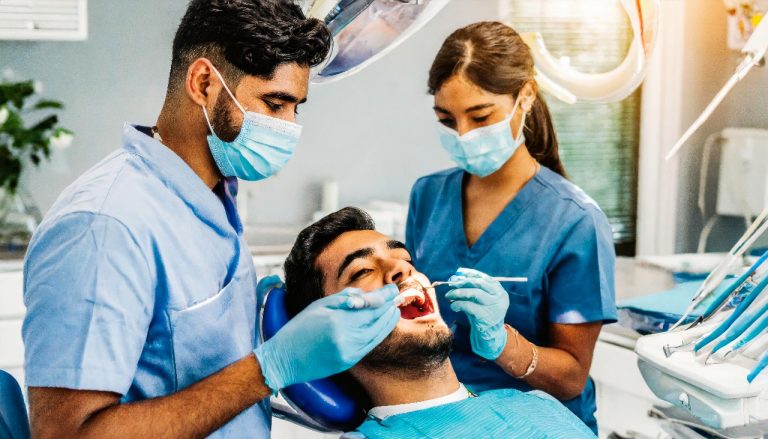Bad breath, medically known as halitosis, is a common yet often misunderstood condition. Many factors can contribute to this unpleasant odour, but one of the leading culprits is poor oral health, including cavities. This article will explore how cavities can cause bad breath, the underlying causes, symptoms, and treatments, and provide actionable steps to maintain a fresh, healthy mouth.
What Are Cavities and How Do They Lead to Bad Breath?
Cavities, also known as dental caries, are caused by the breakdown of tooth enamel due to acids produced by bacteria in the mouth. When these bacteria feed on sugars, they produce acids that erode enamel, forming small holes in the teeth. These cavities create a breeding ground for bacteria, leading to persistent bad breath.
The Role of Bacteria in Cavities and Halitosis
- Bacterial Buildup: Cavities harbour bacteria that produce sulphur compounds, the primary cause of halitosis.
- Trapped Food Particles: Food debris can become lodged in cavities, decomposing and exacerbating the odour.
- Gum Disease: Cavities often occur alongside gum disease, which further contributes to bad breath.
What Are the Symptoms of Cavities Causing Bad Breath?
Bad breath caused by cavities can present with several tell-tale signs:
- Persistent foul odour that brushing does not resolve.
- Metallic or sour taste in the mouth.
- Tooth sensitivity to hot, cold, or sweet foods.
- Visible discoloration or holes in the teeth.
- Inflamed or bleeding gums.
How Can You Prevent Bad Breath From Cavities?
Maintaining good oral hygiene is the cornerstone of preventing both cavities and bad breath. Here’s how you can achieve it:
Daily Oral Hygiene Tips
- Brush teeth twice daily with fluoride toothpaste.
- Floss daily to remove debris between teeth.
- Use an antimicrobial mouthwash to reduce bacterial growth.
- Drink plenty of water to keep your mouth hydrated and rinse away food particles.
Dietary Considerations
- Reduce consumption of sugary foods and drinks, which feed cavity-causing bacteria.
- Eat fibrous fruits and vegetables that stimulate saliva production, which naturally cleanses the mouth.
What Are the Best Treatments for Cavities to Eliminate Bad Breath?
Cavities causing bad breath need professional intervention to restore dental health and eliminate the odour.
Treatment Options
| Cause | Effect | Treatment |
| Bacterial buildup | Persistent bad breath | Antimicrobial rinses, fillings |
| Food particles in cavities | Odour from decomposition | Fillings, professional cleaning |
| Sulphur compounds from bacteria | Foul smell in the mouth | Fluoride treatment, oral hygiene |
| Gum disease | Infected gums causing smell | Scaling, root planing |
Professional Dental Care
- Fillings: Restores tooth structure and eliminates bacteria harbouring spaces.
- Root Canal Therapy: Removes infected tissue from within the tooth in severe decay cases.
- Tooth Extractions: Removes irreparable teeth to prevent further odour and infection.
- Scaling and Root Planing: Treats gum disease, which often coexists with cavities.
What Are the Risk Factors for Cavities and Bad Breath?
Certain conditions and habits can increase the likelihood of developing cavities and bad breath:
- Poor oral hygiene habits.
- High sugar diet.
- Dry mouth (xerostomia) due to medications or dehydration.
- Smoking or tobacco use.
- Untreated gum disease.
How Does Dry Mouth Contribute to Cavities and Halitosis?
Dry mouth occurs when saliva production is insufficient. Saliva plays a crucial role in neutralising acids, washing away food particles, and maintaining oral health. Without adequate saliva, bacteria flourish, leading to both cavities and bad breath.
How Can You Maintain Fresh Breath with Regular Dental Checkups?
Preventative care is key to avoiding cavities and bad breath. Regular dental checkups to dentist fletcher allow for early detection and treatment of cavities before they cause significant issues.
| Hygiene Practice | Benefit |
| Brushing twice daily | Removes plaque and reduces bacteria |
| Flossing | Cleans hard-to-reach areas between teeth |
| Regular dental checkups | Identifies and treats cavities early |
| Drinking water | Keeps mouth hydrated and rinses debris |
| Avoiding sugary foods | Prevents cavity formation and bad breath |
Why Choose Fletcher Dental for Your Oral Health Needs?
At Fletcher Dental, we understand the importance of maintaining fresh breath and healthy teeth. Our experienced team provides comprehensive dental care, including fillings, root canals, and preventative cleanings, to address the root causes of bad breath. We use state-of-the-art technology and personalised care plans to ensure every patient leaves with a confident smile and fresh breath.
Whether you’re experiencing persistent bad breath or want to prevent cavities, Fletcher Dental is here to help. Contact us today for a consultation and let us help you achieve optimal oral health!
Read More: Are Cavities Contagious? The Truth About Tooth Decay and Its Transmission
Reference Section
- Australian Dental Association. (n.d.). “Oral Hygiene and Halitosis.”
- Better Health Channel. (n.d.). “Dental Care for Healthy Teeth.”
- Dental Health Services Victoria. (n.d.). “Cavities and Dental Health.”
FAQs About Cavities and Bad Breath
1. Can cavities alone cause bad breath?
Yes, cavities can harbour bacteria that produce sulphur compounds, leading to persistent bad breath.
2. How can I tell if my bad breath is caused by cavities?
Look for signs such as a persistent foul smell, visible tooth decay, or sensitivity. A dental visit can confirm the cause.
3. Are cavities the only cause of bad breath?
No, bad breath can also result from gum disease, dry mouth, or other medical conditions.
4. How often should I see a dentist to prevent cavities?
It’s recommended to visit your dentist fletcher every six months for routine checkups and cleanings.
5. Is bad breath from cavities reversible?
Yes, addressing cavities through professional dental treatment can eliminate the source of bad breath.
6. Can children get bad breath from cavities?
Yes, cavities in children can lead to bad breath. Encourage proper oral hygiene and regular dental visits to prevent this.

